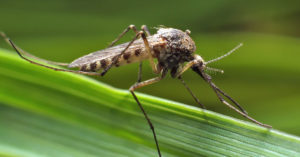 (Cherry Hill, NJ) – Early Thursday morning the Mosquito Control Commission will be in the community spraying and surveilling areas throughout Camden County. The summer weather has created an ideal environment for mosquitoes to breed.
(Cherry Hill, NJ) – Early Thursday morning the Mosquito Control Commission will be in the community spraying and surveilling areas throughout Camden County. The summer weather has created an ideal environment for mosquitoes to breed.
Commissioner Jeff Nash, liaison to the Camden County Mosquito Commission, talked about being cognizant of standing water.
“Although conditions have been dryer than usual, it’s still important that homeowners remember to check their yard and remove any standing water to help eliminate the threat of mosquitos,” Nash said. “Mosquitos need standing water to breed, so you can help keep them off your property by removing water from places like flowerpots and containers. This helps us reduce the pest population in your neighborhood, and it assists the efforts of the Camden County Mosquito Control Commission.”
The Camden County Mosquito Commission will be conducting ULV “spraying” operations on Thursday, June 22 between the hours of 2am-6am in the following locations:
Cherry Hill
Mews Ln
Lane of Trees
E Riding Dr
Spring Mill Dr
Leith Hill Dr
Millhouse Ln
N Riding Dr
Kresson Rd
Ann Dr
Winding Dr
Barbara Dr
Imperial Dr
Indian King Dr
Southwood Dr
E Doris Dr
W Doris Dr
Vanessa Ct
St Mary’s Dr
Doncaster Rd
Oakley Dt
Oakley Dr
Village Dr
Doncaster Ct
Whitby Ct
Whitby Rd
Fatima Ct
Lourdes Dt
Mt Carmel Ct
Fox Hollow Dr
Cooper Run Dr
Forage Ln
Hunters Dr
Hawthrone Dr
Chapel Ave W
Meryl Ln Pebble Ln
Bellows Ln
Pebble Ln
Coach Ln
Darby Ln
Eddy Ln
Forge Ln
Knollwood Dr
Lafferty Dr
Lantern Ln
Knoll Ln
Jade Ln
Ivy Ln
Wagon Ln
Berlin
Jackson Rd
Washington Ave
Hamilton Ave
Jefferson Ave
Marshal St
Bishop Ave
Pine Ave
Davenport Ave
Taunton Ave
McClellan Ave
Summer Ave
Hardie Ave
Birch Ave
N Atlantic Ave
Cushman Ave
Broadview Ave
Prospect Ave
“The commission works with the Public Health Environmental Laboratories in Trenton to verify the presence of West Nile Virus and other communicable diseases in their samples,” Nash said. “If a pool tests positive, the Mosquito Commission returns to spray the area. The sprayings take place when the mosquitoes are most active.”
The mosquito spray is not harmful to humans or pets, but you should avoid direct contact if you have respiratory concerns or are sensitive to irritants.
Residents should check their property for any object that holds water for more than a few days. All pre-adult mosquito stages (eggs, larvae, and pupae) must be in stagnant water in order to develop into adult mosquitoes.
- Swimming pools are a common problem. All pools must be checked and maintained to keep them mosquito-free. Swimming pools can breed mosquitoes within days after you stop adding chlorine or other disinfectant. Pool covers can catch rainwater and become a mosquito development site. Add a little chlorine to kill mosquitoes.
- Maintain screens to prevent adult mosquitoes from entering your home or business.
- Personal protection is strongly urged if you are outside when mosquitoes may be active—generally dawn and dusk. Insect repellants containing between 10-35% DEET are very effective, however, be sure to follow the label directions and take extra precautions with children and infants.
The Camden County Mosquito Commission suggests checking around your yard for mosquito breeding containers. The following is a checklist of tips to help eliminate mosquito breeding:
- Dispose of unnecessary containers that hold water. Containers you wish to save turn upside down or put holes in the bottom so all water drains out.
- Lift up flowerpots and dump the water from the dish underneath every week.
- Stock fish or add mosquito larvicide to ornamental ponds.
- Change water in bird baths, fountains, and animal troughs weekly.
- Screen vents to septic and other water tanks.
- Store large boats so they drain and small boats upside down. If covered, keep the tarp tight so water does not pool on top of the tarp.
- Do not dump leaves or grass clippings into a catch basin or streams.
- Do not allow water to collect on sagging tarps or awnings.
- Do not allow trashcan lids to fill with water.
- Check downspouts that are able to hold enough water to allow mosquito larvae to mature.
For more information, or to report a problem, contact the Camden County Mosquito Commission at (856) 566-2945 or skeeters@camdencounty.com.
